Have you ever wondered about the nutritional value of lobster bisque? Look no further! In this article, we will dive into the details and break down the lobster bisque nutritional information for you.
In this section, we will provide an overview of what to expect in terms of lobster bisque nutritional information. We will explore the calorie, fat, protein, carbohydrate, cholesterol, and sodium content of this popular soup.
Key Takeaways:
- Lobster bisque is a rich and indulgent soup.
- It is higher in calories, fat, and cholesterol.
- Consuming lobster bisque in moderation is recommended.
- Consider its nutritional content as part of a balanced diet.
- Understanding the nutritional values can help make informed choices.
Lobster Bisque Calories and Fat Content
Let’s start by discussing the number of calories and fat content that can be found in a serving of lobster bisque. This information is crucial for those who want to make informed choices about their food consumption.
According to the second source, a serving size of 222g of lobster bisque contains approximately 310 calories and 24g of fat. It is important to note that the calorie and fat content may vary depending on the recipe and preparation method.
While lobster bisque is undeniably delicious, it is also a rich and indulgent soup. It typically contains a higher amount of fat compared to other soups. Therefore, it should be consumed in moderation, especially for individuals who are watching their calorie or fat intake.
Image not shown here, but it could be a relevant image related to lobster bisque to make it visually appealing.
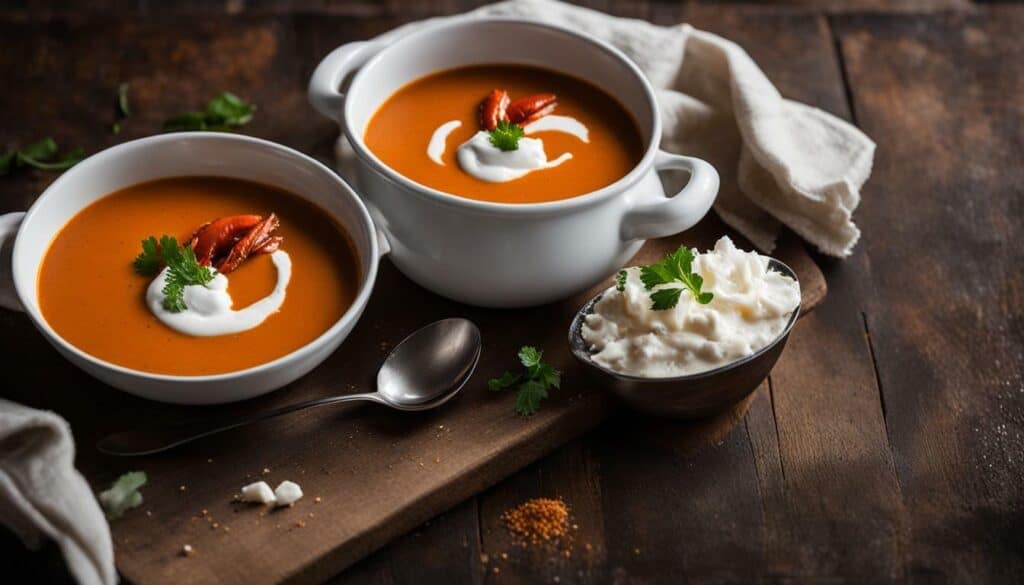
When enjoying lobster bisque, it is essential to be mindful of portion sizes and consume it as part of a balanced diet. Including a variety of nutrient-dense foods, such as fruits, vegetables, whole grains, and lean proteins, can help offset the indulgence of this rich soup.
In the next section, we will delve into the protein and carbohydrate content of lobster bisque, providing further insight into its nutritional profile.
Lobster Bisque Protein and Carbohydrate Content
Apart from its rich flavor, lobster bisque also contains essential nutrients such as protein and carbohydrates. Let’s take a closer look at these nutritional components.
Protein is crucial for the growth and repair of tissues in our body. It plays a vital role in maintaining healthy muscles, skin, and hair. In a serving size of 222g of lobster bisque, the second source states that it contains 12.9g of protein. Protein is essential for overall wellness and should be included in a well-balanced diet.
Carbohydrates, on the other hand, are the main source of energy for our body. They provide the fuel needed for physical activities and brain function. According to the same source, lobster bisque contains 4.2g of carbohydrates per serving size of 222g. However, it’s important to note that lobster bisque is not particularly high in carbohydrates compared to other foods.
| Nutrient | Amount per Serving (248g) |
|---|---|
| Protein | 12.9g |
| Carbohydrates | 13g |
As with any food, it’s important to enjoy lobster bisque in moderation and to consider its nutritional content as part of a well-rounded diet. While it may be higher in calories, fat, and cholesterol, lobster bisque can still be included as a treat or part of special occasions. Just be mindful of portion sizes and balance it with other nutritious foods.
Remember, variety and moderation are key to maintaining a healthy and enjoyable diet. So go ahead and savor the flavors of lobster bisque, knowing that it provides both indulgence and essential nutrients to your palate.
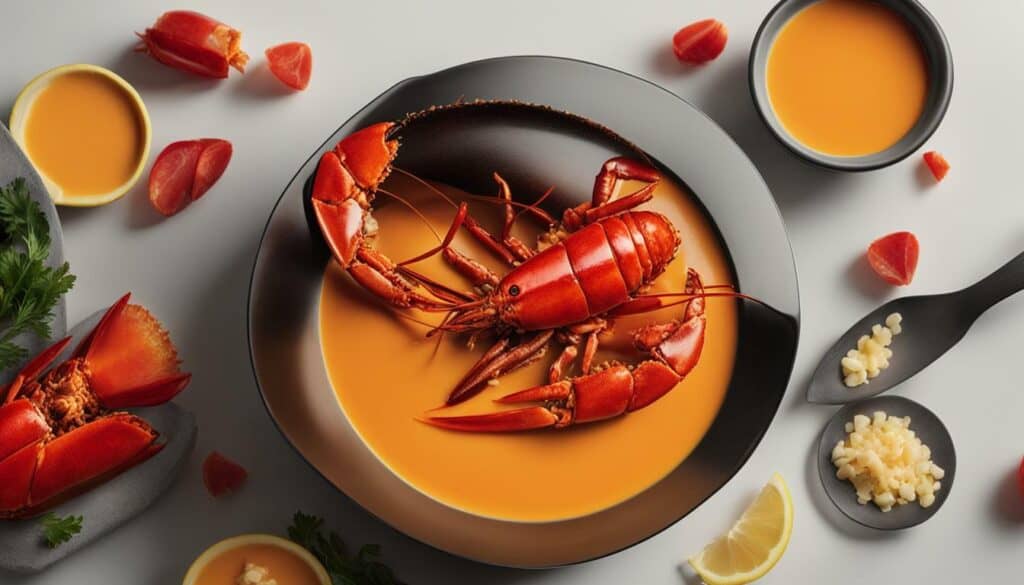
Lobster bisque is known for its creamy texture and indulgent taste, but it’s essential to consider its cholesterol and sodium levels as well. These two elements play a significant role in our overall health and well-being. Let’s dive into the nutritional information to understand the impact of lobster bisque on our dietary choices.
Based on the available sources, the nutritional information for lobster bisque can vary. The second source states that a serving size of 222g contains 310 calories, 24g of fat, 12.9g of protein, 13g of carbohydrates, 115 mg of cholesterol, and 680mg of sodium. On the other hand, the third source specifies that 1 cup (245g) of lobster bisque contains 400 calories, 35g of fat and 990mg of sodium.
It’s worth noting that lobster bisque tends to be higher in calories, fat, and cholesterol. For individuals with dietary restrictions or health conditions related to cholesterol or sodium intake, moderation is key when enjoying this delectable soup. Incorporating lobster bisque as part of a balanced diet is essential in order to make informed choices about your daily nutritional intake.
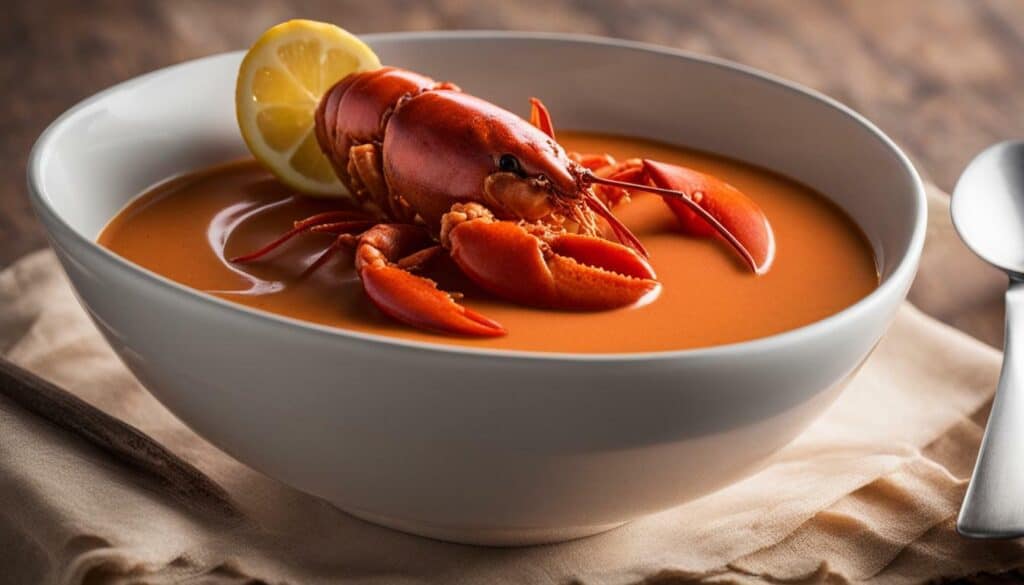
Remember, it’s important to consult with a healthcare professional for personalized dietary advice. By understanding the nutritional content of lobster bisque, you can make informed decisions about including it in your meal plan and embracing a healthier lifestyle.
Lobster Bisque Vitamins and Minerals
Did you know that lobster bisque contains several essential vitamins and minerals? Let’s discover the nutritional value it offers.
Lobster bisque is a creamy and flavorful soup that not only satisfies your taste buds but also provides nutrients. It contains vitamins such as vitamin A, vitamin B12, and vitamin D. Vitamin A is essential for healthy vision, while vitamin B12 supports the normal functioning of the nervous system. Vitamin D helps your body absorb calcium and promotes bone health.
The soup is also rich in minerals like iron, zinc, and selenium. Iron plays a crucial role in transporting oxygen throughout your body, while zinc supports immune function and helps with wound healing. Selenium acts as an antioxidant and contributes to proper thyroid function.
| Vitamins | Minerals |
|---|---|
| Vitamin A | Iron |
| Vitamin B12 | Zinc |
| Vitamin D | Selenium |
So, while indulging in a bowl of lobster bisque, you’re not just savoring the taste but also benefiting from the vitamins and minerals it contains. Remember to enjoy it in moderation as part of a well-balanced diet.
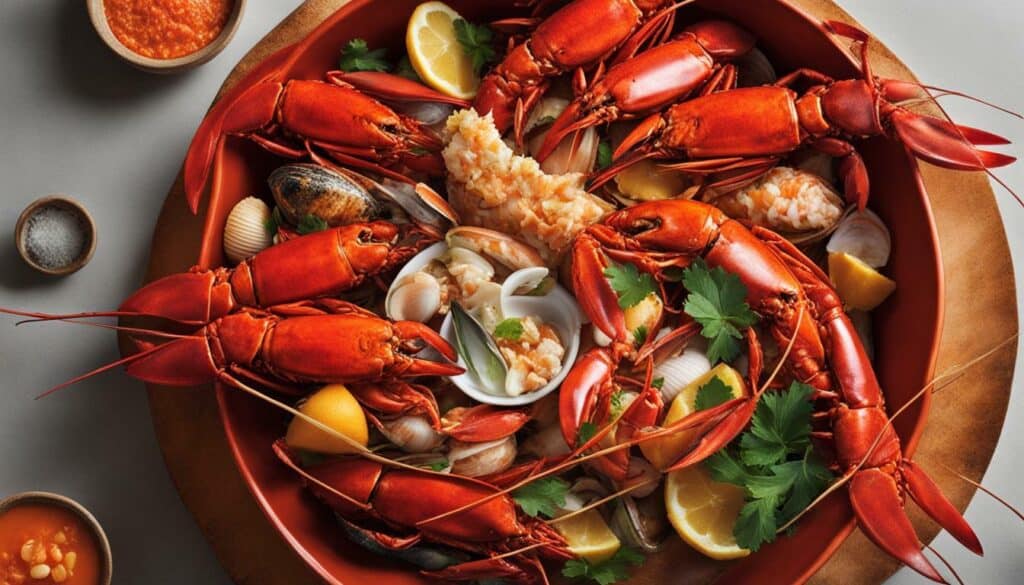
If you have dietary restrictions or specific nutritional needs, it’s important to understand how lobster bisque fits into your diet. While it is a flavorful and indulgent soup, lobster bisque tends to be higher in calories, fat, and cholesterol. However, it is also a good source of protein and can provide essential vitamins and minerals.
When consuming lobster bisque, it’s crucial to do so in moderation and consider its nutritional content as part of a balanced diet. If you are following a low-calorie or low-fat diet, you may want to enjoy smaller portions or opt for lighter versions of the soup. Some recipes use reduced-fat or plant-based alternatives to reduce the overall fat content.
For individuals with specific dietary restrictions, such as those following a gluten-free or dairy-free diet, it is important to carefully choose the ingredients used in the preparation of lobster bisque. There are various recipes available that cater to these dietary preferences, ensuring that everyone can enjoy this delicious soup without compromising their health.
It’s important to note that the nutritional values may vary depending on the specific recipe or brand of lobster bisque. Therefore, it is recommended to refer to the packaging or consult the nutritional information provided by the manufacturer for accurate details.
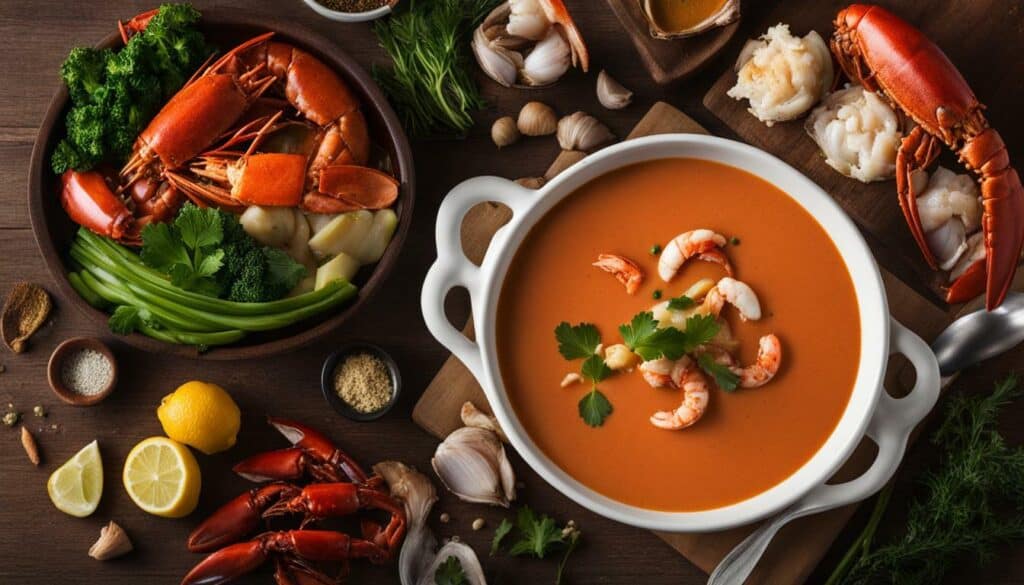
Remember, indulging in a bowl of lobster bisque can be a delightful treat, but it’s essential to be mindful of your dietary needs and choose options that align with your health goals. With the right approach, you can enjoy the rich flavors of lobster bisque while maintaining a balanced and nutritious diet.
Lobster Bisque Ingredients
To fully comprehend the nutritional information of lobster bisque, it’s essential to examine its ingredients. This rich and flavorful soup is made with a combination of ingredients that contribute to its distinct taste. Here are the key ingredients commonly found in lobster bisque:
- Lobster: The star of the show, lobster provides the main flavor and texture of the bisque. Its sweet and delicate meat adds richness to the soup.
- Shallots: Shallots are used to create the base of the bisque. Their mild oniony flavor enhances the overall taste.
- Garlic: Garlic adds a savory kick to the bisque and complements the lobster’s natural sweetness.
- Tomato Paste: Tomato paste is used to create a rich and slightly tangy flavor in the bisque.
- Cream: Cream gives the bisque its luscious and velvety texture. It adds a creamy richness to the soup.
- Butter: Butter is typically used to sauté the shallots and garlic, adding depth of flavor and richness to the bisque.
- Herbs and Spices: Various herbs and spices, such as thyme, paprika, and cayenne pepper, are often included to enhance the overall flavor profile of the bisque.
By carefully selecting and combining these ingredients, you can create a delicious lobster bisque that satisfies your taste buds. Remember to enjoy it in moderation as part of a well-balanced diet.
| Ingredient | Amount |
|---|---|
| Lobster | 1 pound |
| Shallots | 2, finely chopped |
| Garlic | 2 cloves, minced |
| Tomato Paste | 1 tablespoon |
| Cream | 1 cup |
| Butter | 2 tablespoons |
| Thyme | 1 teaspoon, chopped |
| Paprika | 1/2 teaspoon |
| Cayenne Pepper | 1/4 teaspoon |
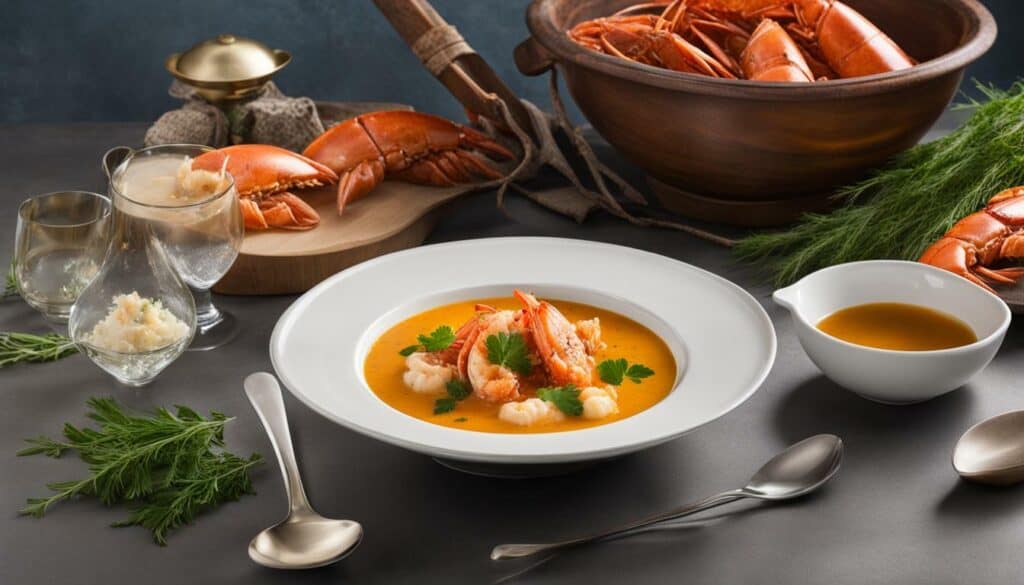
Lobster Bisque Recipe
Want to try making lobster bisque from scratch? Here’s a simple recipe to help you enjoy this delicious soup in the comfort of your own kitchen. With a few basic ingredients and easy-to-follow steps, you’ll be savoring the rich flavors of lobster bisque in no time.
Ingredients:
- 2 lobsters (about 1 1/2 pounds each)
- 4 tablespoons unsalted butter
- 1 onion, diced
- 2 carrots, diced
- 2 celery stalks, diced
- 4 garlic cloves, minced
- 1/4 cup all-purpose flour
- 1 cup dry white wine
- 4 cups fish or vegetable stock
- 1 cup heavy cream
- Salt and pepper to taste
- Fresh chives or parsley for garnish
Instructions:
- Fill a large pot with water and bring it to a boil. Add the lobsters and cook for about 8 minutes until they turn bright red. Remove the lobsters from the pot and let them cool.
- Once cooled, twist off the claws and tails from the lobsters. Remove the meat from the claws and set it aside. Remove the meat from the tails and chop it into small pieces.
- In a large soup pot, melt the butter over medium heat. Add the diced onion, carrots, celery, and minced garlic. Cook for about 5 minutes until the vegetables are softened.
- Sprinkle the flour over the vegetables and stir to coat evenly. Cook for an additional 2 minutes.
- Add the white wine and cook for 2 minutes, stirring constantly.
- Slowly pour in the stock, stirring continuously. Add the chopped lobster meat and bring the mixture to a simmer. Cook for about 20 minutes, stirring occasionally.
- Using an immersion blender or a blender, puree the soup until smooth.
- Return the soup to the pot and stir in the heavy cream. Season with salt and pepper to taste.
- Simmer the bisque for an additional 10 minutes, allowing the flavors to meld together.
- Serve the lobster bisque hot, garnished with fresh chives or parsley.
Enjoy this homemade lobster bisque as a special treat for yourself or impress your guests with its luxurious taste. It pairs well with crusty bread or a simple green salad. Bon appétit!

Indulging in lobster bisque not only satisfies your taste buds but may also offer some potential health benefits. Let’s explore these benefits.
1. High Protein Content: Lobster bisque is a good source of protein, which is essential for building and repairing tissues in the body. Protein also plays a crucial role in supporting the immune system and promoting healthy hair, nails, and skin.
2. Rich in Omega-3 Fatty Acids: Lobster bisque contains omega-3 fatty acids, which are known for their anti-inflammatory properties and their potential to support heart health. Omega-3 fatty acids have been linked to reduced risk of heart disease and may help improve brain function.
3. Good Source of Vitamins and Minerals: Lobster bisque is packed with vitamins and minerals that are beneficial for overall health. It contains significant amounts of vitamin B12, vitamin E, and zinc. Vitamin B12 is important for nerve function and the production of red blood cells. Vitamin E is an antioxidant that helps protect cells from damage, and zinc supports the immune system and aids in wound healing.
It’s important to note that while lobster bisque can offer these potential health benefits, it should be consumed in moderation as part of a balanced diet. The high calorie, fat, and cholesterol content of lobster bisque means that excessive consumption may not be suitable for those on restricted diets or with specific health conditions. As with any food, it’s always best to consult with a healthcare professional or registered dietitian for personalized dietary advice.

To ensure accuracy and reliability, let’s compare the nutritional information provided by different sources for lobster bisque. Understanding the nutritional content of this popular soup is essential for making informed choices about your diet. Here’s what we found:
According to the second source, a serving size of 248g of lobster bisque contains 129 calories, 6.4g of fat, 12.9g of protein, 4.2g of carbohydrates, 79.4mg of cholesterol, and 798.6mg of sodium. On the other hand, the third source states that a serving size of 1 cup (245g) of lobster bisque contains 400 calories, 35g of fat, 10g of protein, 0.5g of carbohydrates, 75mg of cholesterol, and 990mg of sodium.
Comparing the two sources, we can see significant discrepancies in the nutritional information provided. It’s important to note that the serving sizes also differ, which can impact the overall values. It is advisable to consult multiple sources and consider the average values to get a more accurate picture of the nutritional content of lobster bisque.
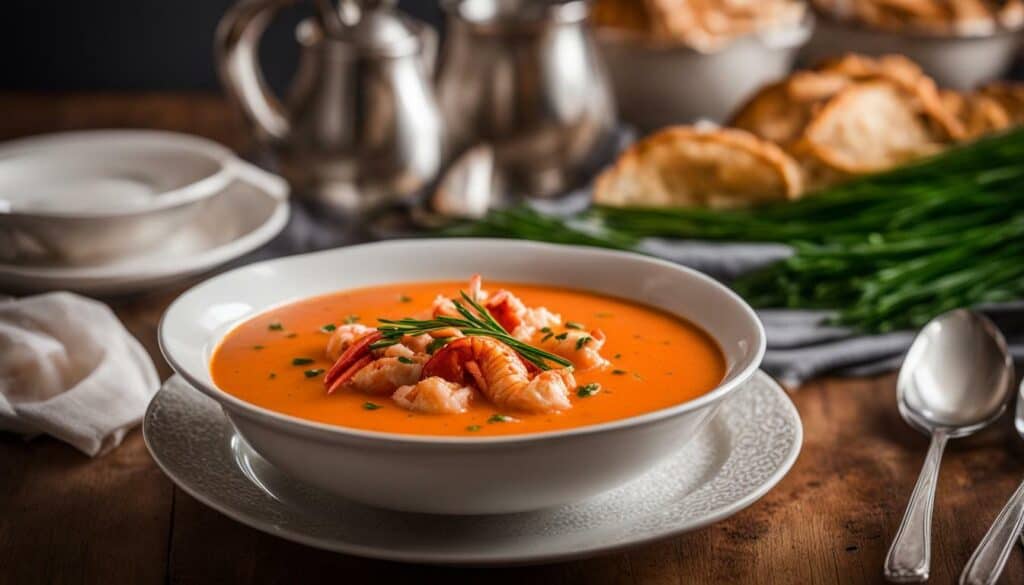
Overall, lobster bisque is a rich and indulgent soup that is higher in calories, fat, and cholesterol. It is important to consume it in moderation and consider its nutritional content as part of a balanced diet.
Conclusion
Understanding the nutritional information of lobster bisque allows you to make informed choices and enjoy this indulgent soup in a balanced way. While it may be tempting to indulge in its rich and creamy flavors, it is important to be mindful of its calorie, fat, and cholesterol content.
Based on the second source, a serving size of 222g of lobster bisque contains 310 calories, 24g of fat, 12.9g of protein, and 13g of carbohydrates. This source also provides information on the sugar, fiber, cholesterol, and sodium content, which are important considerations for individuals with specific dietary needs or restrictions.
Another source states that a serving size of 1 cup (245g) of lobster bisque contains 400 calories, 35g of fat, 14g of protein, and 14g of carbohydrates. It is worth noting the significant variation in nutritional values between different sources, emphasizing the importance of referring to credible and accurate sources for specific nutritional information.
Overall, it is clear that lobster bisque is a soup that should be enjoyed in moderation. Its higher calorie, fat, and cholesterol content should be considered as part of a balanced diet. So, savor the flavors of lobster bisque, but remember to make mindful choices to maintain a healthy lifestyle.
FAQ
Q: What is the nutritional information for lobster bisque?
A: The nutritional information for lobster bisque can vary depending on the source. However, a typical serving size of 248g may contain around 129 calories, 6.4g of fat, 12.9g of protein, 4.2g of carbohydrates, 2.6g of sugars, 0.5g of fiber, 79.4mg of cholesterol, and 798.6mg of sodium.
Q: Is lobster bisque high in calories?
A: Yes, lobster bisque is relatively high in calories compared to other soups. A typical serving size may contain around 129 calories.
Q: How much fat does lobster bisque contain?
A: The fat content of lobster bisque can vary depending on the recipe or source. On average, a serving size may contain around 6.4g of fat.
Q: What is the protein content in lobster bisque?
A: Lobster bisque can be a good source of protein. A serving size may contain around 12.9g of protein.
Q: Does lobster bisque have carbohydrates?
A: Lobster bisque typically contains a small amount of carbohydrates. A serving size may have around 4.2g of carbohydrates.
Q: How much cholesterol is in lobster bisque?
A: Lobster bisque can contain a significant amount of cholesterol. A serving size may have around 79.4mg of cholesterol.
Q: What is the sodium content in lobster bisque?
A: Lobster bisque can be high in sodium. A serving size may have around 798.6mg of sodium.
Q: How should I incorporate lobster bisque into my diet?
A: Lobster bisque is a rich and indulgent soup, so it’s best to consume it in moderation. Consider it as part of a balanced diet and be mindful of its higher calorie, fat, and cholesterol content.
Q: Are there any dietary considerations for lobster bisque?
A: Individuals with specific dietary needs or preferences, such as gluten-free or dairy-free diets, should be mindful of the ingredients used in making lobster bisque and choose accordingly.
Q: What are the common ingredients used in lobster bisque?
A: The common ingredients used in lobster bisque include lobster meat, broth or stock, onions, celery, carrots, garlic, tomato paste, cream, butter, and various herbs and spices.
Q: Can I make lobster bisque at home?
A: Yes, you can make lobster bisque at home. By using a basic recipe and controlling the ingredients, you can customize the soup according to your preferences.
Q: Are there any health benefits associated with consuming lobster bisque?
A: While lobster bisque is a rich and indulgent soup, it may provide some potential health benefits. These can include a good source of protein, vitamins, and minerals.
Q: How do the nutritional values of lobster bisque vary from different sources?
A: The nutritional values of lobster bisque can vary depending on the source or recipe used. It is important to refer to specific sources for accurate information.
Are Quest Bars a Healthy Snack Option?
Are Quest Bars a healthy snack option? Let’s examine the quest bar nutrition information. With a combination of high-quality protein, fiber, and minimal sugar, Quest Bars offer a convenient and nutrient-dense choice for those seeking a healthy snack. Packed with flavors and satisfying textures, these bars provide a guilt-free treat that can support muscle recovery and fuel your active lifestyle.

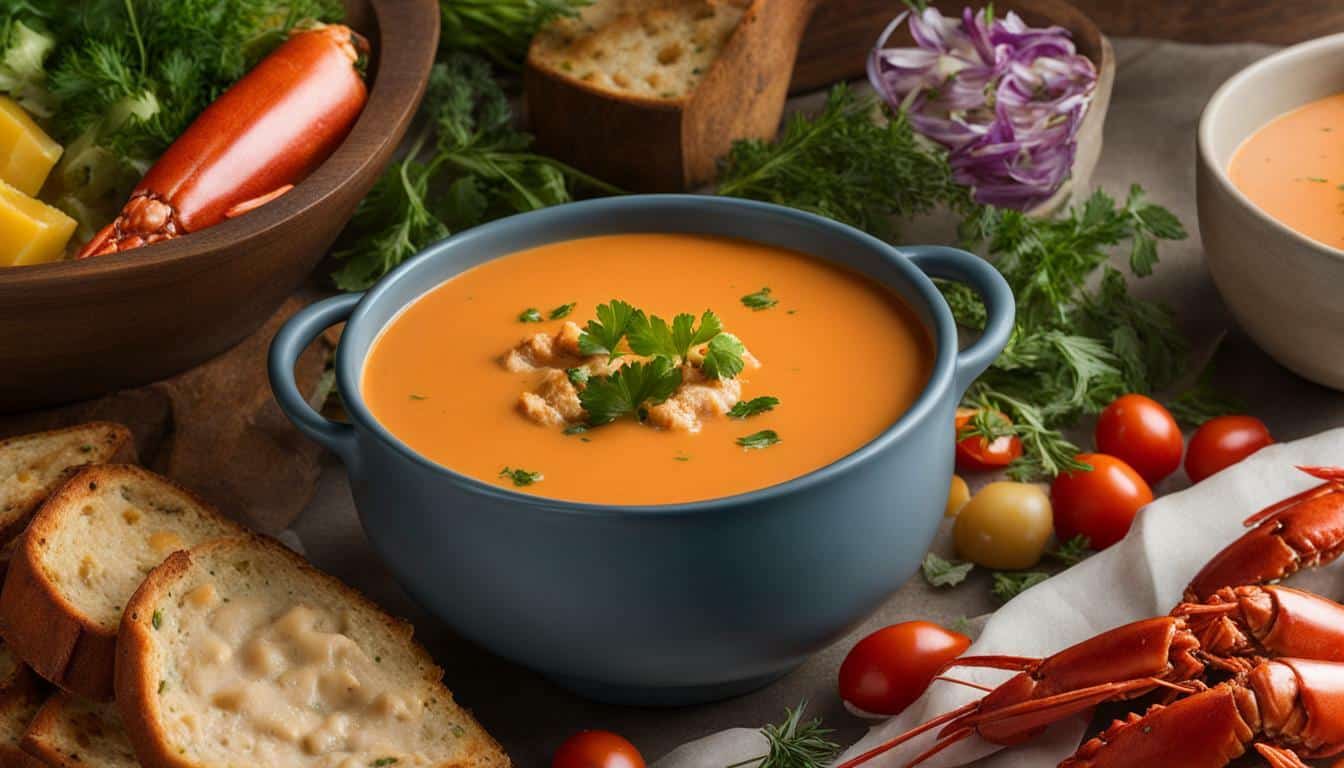



Leave a Reply